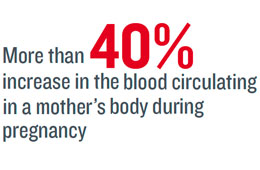If you have a heart condition, you should get specialist advice before trying to conceive, says Dr Thorne, who specialises in adult congenital heart disease and heart disease in pregnancy.
“It’s important to see the right cardiologist, preferably alongside an obstetrician,” advises Dr Thorne. “If you’re being seen by a congenital heart disease service, they should have the right degree of knowledge, but if you’re seeing a general cardiologist, you may need to ask to be referred to a specialist.”
“It’s important not to fall pregnant accidentally,” says Dr Thorne. “Think about contraception. There are several heart conditions where you will not be able to take the combined pill. If you are taking a progestogen-only pill, get advice to ensure you choose the most effective one.
 She says women should be particularly careful if they suffer from cardiomyopathy or diseases affecting the aorta (such as Marfan syndrome or Loeys–Dietz syndrome) or mitral or aortic valve stenosis.
She says women should be particularly careful if they suffer from cardiomyopathy or diseases affecting the aorta (such as Marfan syndrome or Loeys–Dietz syndrome) or mitral or aortic valve stenosis.
Pulmonary arterial hypertension (which is rare but more common in women) can be extremely dangerous in pregnancy, so women would usually be advised against having a child.
“Pregnancy may make your condition worse, so consider how you would cope with a baby,” adds Dr Thorne.
Some women won’t realise they have heart conditions until problems arise and, although numbers are small, heart attacks are one of the biggest causes of maternal death in the developing world. It’s worth reducing your risks before you get pregnant. “Lose weight if you are overweight, take regular exercise, stop smoking and manage issues like high blood pressure,” says Dr Thorne.
Some conditions that can develop during or after pregnancy include:
Postpartum cardiomyopathy
Also called peripartum cardiomyopathy, this rare form of heart failure occurs in the last month of pregnancy, or up to five months after giving birth. The symptoms include tiredness, shortness of breath, swollen ankles, swollen neck veins, and feeling of missed heartbeats or palpitations.
Read about Jennie, who developed postpartum cardiomyopathy after giving birth to her son.
Pre-eclampsia
This affects up to six per cent of women during the second half of pregnancy or soon after giving birth. Early signs include high blood pressure and protein in your urine. Women are tested for these at antenatal appointments, as symptoms may not be obvious. Most cases are mild, but it can have serious complications for both mother and baby if not treated. It will usually go away after birth.
Although the exact cause isn’t known, having diabetes and high blood pressure could increase your chances of developing pre-eclampsia, so it’s important to follow a healthy lifestyle to reduce your risk as much as you can.
Gestational diabetes
 Gestational diabetes is fairly common during pregnancy, especially after 28 weeks. It affects up to 18 out of every 100 women who give birth in England and Wales.
Gestational diabetes is fairly common during pregnancy, especially after 28 weeks. It affects up to 18 out of every 100 women who give birth in England and Wales.
Symptoms include dry mouth, needing to urinate frequently, tiredness and infections such as thrush. It can be controlled with diet and exercise, but some women need medication.
Untreated, it can cause premature birth or health issues for the baby, such as low blood sugar. It often goes away after birth, but you’re at increased risk in future pregnancies. It also means you are at an increased risk of developing type 2 diabetes.
Research into rare conditions
Spontaneous coronary artery dissection (SCAD) happens when inner layers of a coronary artery tear away from the outer layer. It can lead to a heart attack and can be fatal.
Eighty per cent of sufferers are women, and 30 per cent are in late pregnancy or have recently given birth. We’re funding the UK’s first research into this poorly understood condition.
We’re also funding research into pulmonary arterial hypertension – a condition affecting blood vessels in the lungs. Women are four times more likely to be affected, possibly because sex hormones play a role in the development of the condition.


